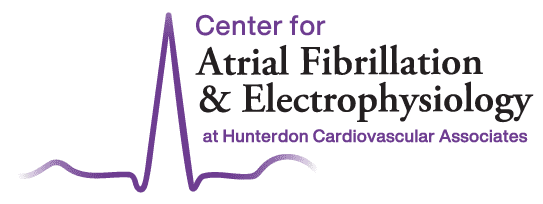
If you or a loved one has been recommended to see an electrophysiologist, you may have questions about what the electrophysiology specialty entails. At The Center for Atrial Fibrillation and Electrophysiology at Hunterdon Cardiovascular Associates (HCA), electrophysiologists provide expert care for patients suffering from heart conditions related to their heart’s electrical rhythm.
Here’s what you need to know about electrophysiologists and how they can help.
What Is an Electrophysiologist?
An electrophysiologist is a cardiologist physician who has received additional training in the field of electrophysiology. After receiving a medical degree, an electrophysiologist attends a 3-year internal medicine residency and a 3-year cardiovascular disease fellowship, followed by an additional year (or more) to become certified in electrophysiology. This additional training makes electrophysiologists experts at studying, diagnosing, and managing problems with the heart’s electrical conduction system.
Types of Heart Conditions Electrophysiologists Treat
An electrophysiologist has specialized knowledge about how electricity works within the heart muscle. Electrical signals are the impulses that prompt the heart to pump blood throughout the body—and when that electrical conduction becomes disrupted, it can cause heart rhythm problems. Electrophysiologists can help patients with electricity-related heart problems such as:
- Atrial fibrillation
- Atrial flutter
- Bradycardia
- Tachycardia
- Sick sinus syndrome
- Ventricular fibrillation
- Premature ventricular contraction
- Heart block
- Long QT syndrome
- Brugada syndrome
- Wolff-Parkinson-White syndrome
Electrophysiologists are also experts at deciphering rhythm problems caused by medications and other special medical conditions. To carry out their diagnoses, electrophysiologists use tests such as electrocardiograms (EKGs), tilt table tests, and specialized electrophysiology studies that evaluate the heart’s electrical signals using small catheters.
When to See an Electrophysiologist?
If you have been having symptoms such as a racing heart, sudden passing out, chest pain, shortness of breath, or dizziness, it may be coming from a problem with your heart’s electricity. A primary care doctor or cardiologist may identify a problem with your heart’s electricity and then refer you to an electrophysiologist to help you most expertly manage the condition. An electrophysiologist can help with abnormal heart rhythms (also known as “arrhythmias”) in many ways, including prescribing medication, performing cardiac ablations, and placing pacemakers, implantable cardioverter defibrillators (ICDs), and cardiac resynchronization (CRT) devices.
Managing Heart Arrhythmias with The Center for Atrial Fibrillation and Electrophysiology at HCA
The expert physicians and their support staff at The Center for Atrial Fibrillation and Electrophysiology at HCA are committed to providing high-quality, comprehensive care to patients experiencing the symptoms of an electricity-related heart condition, such as an arrhythmia. If you’re experiencing symptoms of an abnormal heart rhythm, contact us online or call us at 908-806-0190 today.
